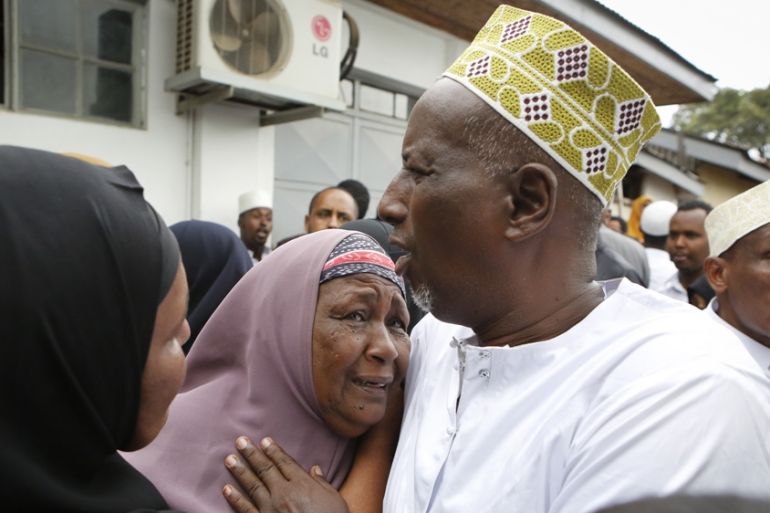Kenyans face up to ‘homegrown’ threat after hotel attack
In previous al-Shabab attacks, the perpetrators were often Somali; in the Nairobi hotel siege, many were Kenyan.

Nyeri, Kenya – As the early morning fog gave way to bright sunshine, residents of Majengo in the town of Nyeri in central Kenya, stepped gingerly out of their homes.
Most were quiet and appeared uneasy as groups of young students in uniform rushed to get to school.
Keep reading
list of 4 itemsAl-Shabab claims attack on UAE military in Somalia
Somalia begins ‘efforts to rescue’ UN helicopter crew held by al-Shabab
Al-Shabab captures UN helicopter in central Somalia
The day before, the community found out that one of their own was involved in a deadly attack on an upscale hotel and office complex in the capital, Nairobi.
CCTV footage from the scene of the attack showed Salim Ali Gichunge to be one of the assailants.
The gunmen, members of the al-Qaeda-linked armed group al-Shabab, killed at least 21 people in the siege which lasted for 19 hours.
The residents in this sprawling informal settlement remain in shock, unable to make sense of how Gichunge took part in the killing of his own countrymen.
“Our children have no jobs. They need to eat. Most of them have dropped out of school and their parents are too poor to help them continue with education,” Ratib Hussein, a community leader, told Al Jazeera.
“The parents have no idea when and how the al-Shabab recruiters come for their children,” Hussein adds, standing a short distance from the house where Gichunge was born and spent his early years.
![People are evacuated by a member of security forces during the al-Shabab attack in Nairobi [Baz Ratner/Reuters]](/wp-content/uploads/2019/01/bb7fa840a2664646b0723efe535d59f6_18.jpeg)
In the last five years, al-Shabab fighters have carried out more than 20 attacks in Kenya that have left at least 300 people dead.
The last time the group carried out a major attack in Nairobi was 2013. Fighters from the group killed more than 60 people in a four-day siege at a shopping mall.
But this attack was different. At least three of the five gunmen seen in the CCTV footage were Kenyans. The suicide bomber was from the coastal city of Mombasa and another attacker came from Limuru.
The fighters who carried out the Westgate mall attack were from Somalia.
Domestic threat
Kenyans are now waking up to a different threat – one that they had not suspected existed until Tuesday’s attack. So-called “homegrown terrorism” has now emerged as a real threat in the East African country of 50 million people.
Shortly after the siege ended, Kenyan President Uhuru Kenyatta said the attackers were eliminated. It is not clear how many attackers were killed. Some media reports said Gichunge was captured and is being held in police custody.
Gichunge, also known as Farouk, moved from Nyeri to Isiolo during his teenage years, according to his family. He then moved to Mombasa before moving to Somalia and joining the armed group about three years ago, according to residents.
In every major city in Kenya, there are large informal settlements where most are struggling to put food on the table.
High unemployment is common in Majengo, especially among young people, making the slum a fertile ground for recruiters offering money and other incentives.
“Young people here have nothing to do. They leave the house in the morning and you don’t know what they are doing. Some go missing and parents don’t know where they went. It is painful. But there is nothing for them to do here,” Hussein, the Majengo community leader, added.
Following the siege, Kenyatta promised to make Kenya “inhospitable” for armed groups like al-Shabab.
“We will seek out every single person that was involved in the funding, planning and execution of the heinous act. We will pursue relentlessly wherever they will be until they are held to account,” Kenyatta said in a televised addressed on Wednesday.
‘Investment in de-radicalisation’
Security experts say the government should not just rely on the use of force when addressing homegrown threats.
“Government must invest heavily in de-radicalisation programs,” Mwenda Mbijiwe, a Nairobi-based security analyst, told Al Jazeera.
“And for de-radicalisation to be successful we do not need to do too much. We just need to create a little doubt in the mind of the terrorists that what they are doing could be wrong. If we manage to create that, then that will surely be a success,” Mbijiwe added.
In the predominately Somali neighbourhood of Eastleigh, a Nairobi suburb, residents have long complained that they were being unfairly targeted by the security forces, arguing that al-Shabab fighters are not just Somalis.
In the wake of previous al-Shabab attacks in the capital, the government has launched crackdowns in the area.
Yusuf Hassan, a legislator from Eastleigh, told Al Jazeera that the challenge posed by al-Shabab is not confined to the suburb.
“No longer do people feel that al-Shabab is a problem for just one community that should be vilified and taken out of Kenya,” Hassan said.
“We are happy with this realisation but are also ready to share our experiences.” Hassan, who survived a grenade attack blamed on al-Shabab in 2012, added.
For several hours on Friday, traders in Eastleigh closed their businesses as a show of solidarity with the victims of Tuesday’s attack.
“We Kenyans are one people,” Mohamed Ali, a businessman, told Al Jazeera. “We are deeply hurt by what happened on Tuesday. That attack also shows everyone that al-Shabab is not just from this community.”